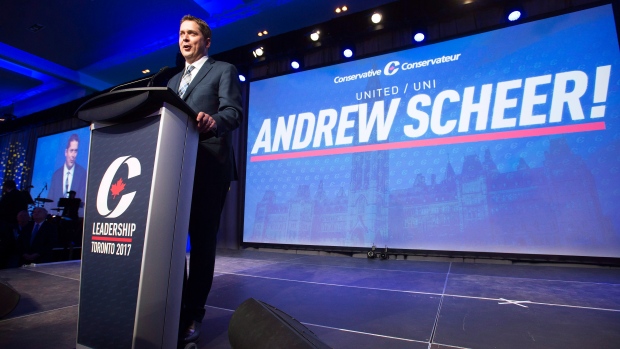May 29, 2017
5 things you need to know about Scheer’s economic policies

Andrew Scheer is the new leader of the Conservative Party of Canada. The Saskatchewan MP and former Speaker of the House of Commons has been relatively quiet about his policy priorities in the past, but now that he has been handed the reigns of the federal Official Opposition, Canadians can expect him to be more vocal about his views.
Below, BNN takes a look at what Scheer wants to do for the Canadian economy should he become Prime Minister in 2019.
TWO YEARS TO A BALANCED BUDGET
If he leads the Tories to victory in 2019, a Prime Minister Scheer would promise to spend no more than the government makes within two years of taking office. Details will be especially important here, since the most recent update from Ottawa last week said the Liberal government will end the current fiscal year more than $23 billion in the red. By 2019, the deficit is expected to surpass $27 billion and according to an internal Finance Canada analysis published in late December 2016, Ottawa is on track to post decades of deficits until finally returning to balance sometime around 2050. Aside from raising taxes or introducing new ones (anathema for a Conservative) Scheer would have to dramatically cut spending to achieve his goal.
KILL CARBON TAXES
Calling it a “cash grab” and a “job killer” in his victory speech on Saturday, Scheer took direct aim at the federal carbon tax legislation current Prime Minister Justin Trudeau’s governing Liberal Party plans to put in effect starting next year. Repealing the carbon tax – which Trudeau’s team has argued is the opposite of a “cash grab” as it raises no additional federal government revenue – would be the first piece of legislation tabled by a Scheer-led government. The new Conservative leader instead prefers selling made-in-Canada carbon capture and storage (CCS) technology to more heavily polluting countries around the world – China and India in particular – despite major government subsidies having been necessary for every major CCS project constructed in Canada to date.
KEEP SUPPLY MANAGEMENT
Opposing the controversial policy of supply management is arguably what kept longtime Conservative leadership frontrunner Maxime Bernier from claiming victory in the 13th and final ballot on Saturday. Scheer supports supply management, which some see as indirect government subsidization of the dairy industry. He even told reporters after his victory that support among Quebec dairy farmers “absolutely” helped lead to his win. To that end, Scheer even won in Bernier’s home riding of Beauce, Quebec; where Bernier has been elected in every general election since 2006. U.S. President Donald Trump has taken aim at Canada over supply management, pledging to address the issue in upcoming renegotiations of the North American Free Trade Agreement. In defeating Bernier, Scheer has removed the possibility of Trump having a powerful Canadian politico as an ally on the supply management issue.
APPROVE ENERGY EAST
Easily the most creative proposal Scheer made over the course of the Conservative leadership campaign was to put the flags of countries that send crude oil to Canada on gasoline pumps across the country. The idea would be for Canadians to know where their gas originally came from but the implicit policy is an endorsement of the $15-billion Energy East pipeline from Calgary-based TransCanada. Right now there is no convenient and affordable way to ship crude oil extracted in western Canada to be refined in eastern Canada, which is why refineries from the Maritimes through Ontario have to source most of their crude from abroad. Energy East would ship more than enough crude to New Brunswick for the maple leaf to be the only flag Canadians would ever see under Scheer’s scheme; even if the already low odds of Energy East ever actually getting built have only been getting lower lately.
KEEP CANNABIS LEGAL
While opposed to the legalization of recreational marijuana for adult use in principle, Scheer seems to acknowledge the economic pitfalls of trying to reinstate prohibition once tens of thousands of Canadians are employed in income-tax-paying CPP-contributing jobs related to the cannabis sector. “I am very realistic,” Scheer said last month when asked about his views on the current Liberal plan to legalize marijuana by July of 2018. “Once [marijuana] is legal in a short period of time there’s going to be a lot of people that work for companies that distribute it… so we have to be very realistic as a party.”
CORRECTION: An earlier version of this story incorrectly stated Andrew Scheer was elected Conservative Party leader on the 14th ballot.


